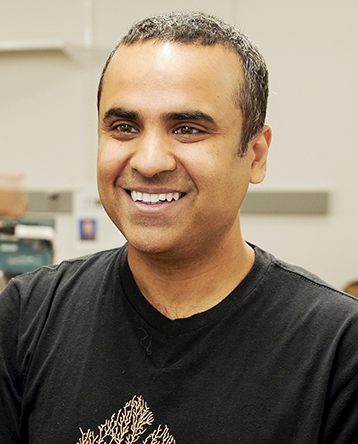Pulkit Grover
Angel Jordan Career Development Professor, Biomedical Engineering, Electrical and Computer Engineering
Angel Jordan Career Development Professor, Biomedical Engineering, Electrical and Computer Engineering

Pulkit Grover is a professor in the Department of Electrical and Computer Engineering at Carnegie Mellon University. He received his Ph.D. from the University of California, Berkeley in 2010. He focuses on interdisciplinary research directed towards developing a science of information for understanding/designing energy-efficient and stable decentralized systems (from low-power communication/computation systems, to large control, computational, and biological systems). He is the recipient of an NSF CAREER Award (2014), the best paper award at the International Symposium on Integrated Circuits (ISIC), the best student paper award at the IEEE Conference in Decision and Control (CDC) 2010, and the 2012 Leonard G. Abraham best paper award from the IEEE Communications Society for his work on energy-efficient communication. For his dissertation research, he received the 2011 Eli Jury Award from the Department of Electrical Engineering and Computer Sciences at UC Berkeley.
He was a co-editor of the IEEE Journal on Selected Areas in Communications (JSAC) special issues on “Energy Harvesting and Wirelessly Powered Communications” (2014-15).
2010 Ph.D., Electrical Engineering and Computer Science, University of California Berkeley
2005 M.Tech, Electrical Engineering, Indian Institute of Technology, Kanpur
2003 B.Tech, Electrical Engineering, Indian Institute of Technology, Kanpur
CMU Engineering
Carnegie Mellon University researchers have developed a new method for deep brain stimulation called “DeepFocus” that is minimally invasive and could treat conditions like PTSD and addiction.
CMU Engineering
Carnegie Mellon University researchers unveil groundbreaking insights into the mechanisms and limitations of temporal interference stimulation for non-invasive neurostimulation.
CMU Engineering
The Dowd Engineering Seed Fund for Graduate Student Fellowships funds innovative research proposals.
Pitt CTSI
ECE’s Pulkit Grover and MechE’s Doug Weber won $50,000 to research female pain
CMU Engineering
CMU study explores the influence of melanin on near-infrared spectroscopy (NIRS), an optical tool that leverages light-tissue interaction to measure changes in hemoglobin concentration and oxygenation.
CMU Engineering
The American Institute for Medical and Biological Engineering (AIMBE) has announced the induction of Pulkit Grover, professor of electrical and computer engineering, to its College of Fellows.
CMU Engineering
Researchers from Carnegie Mellon University, the University of Pittsburgh, and the University of Cincinnati have combined their expertise in engineering and medicine to create a noninvasive method for detecting worsening brain injuries before they happen. This advancement could reshape neurocritical care.
CMU News
The Neuroscience Institute’s Jasmine Kwasa received a Fulbright U.S. Scholar Program award to support epilepsy monitoring research in Kenya.
CMU Engineering
Afretec has awarded 11 grants, each led by a multi-university research team, to build research capacity and work toward achieving the UN Sustainable Development Goals (SDGs) in Africa.
CMU College of Engineering
Afretec has awarded 11 grants, each led by a multi-university research team, to build research capacity and work toward achieving the UN Sustainable Development Goals in Africa.
CMU-Africa
The African Engineering and Technology Network, led by CMU-Africa, awarded six planning grants to research collaborations that will lead to socio-economic impact and focus on driving inclusive digital growth on the continent.
IEEE Information Theory Society
ECE’s Pulkit Grover was named the 2022-2023 Distinguished Lecturer for IEEE’s Information Theory Society. Grover plans to give talks in Asia, Africa, and various places in North and South America, supported by this program.